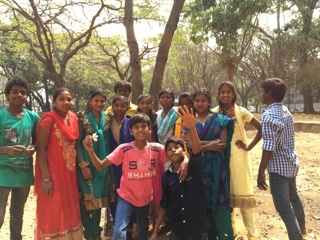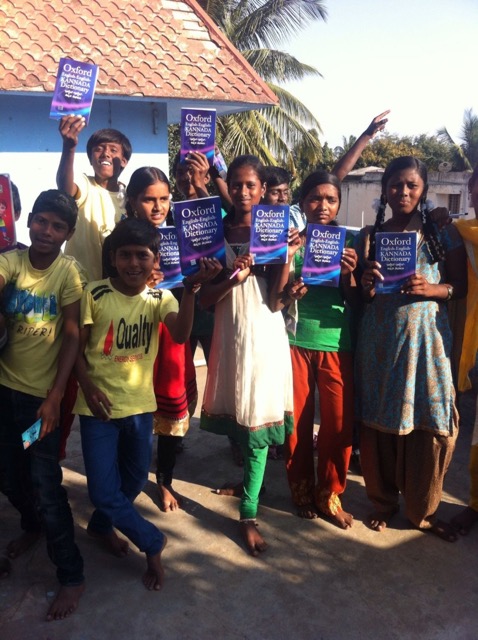This month we caught up with Becky Bowers, a research student in anthropology who focuses on female construction workers and gendered spaces in Bengaluru. While working on the field in Bengaluru, she decided to undertake the rather challenging task of starting an English class for the children of the construction workers. This is one of the most insightful and vital community posts that we have done, so we implore you to take some time and hear what Becky has to say.
What sparked the idea that led to this initiative? What were the initial responses from the children and their parents? What were some of the hurdles that you had to encounter?
There were a couple of moments that sparked this for me: Firstly, I frequently encountered people in my work who asked ‘What are you doing for the poor?’ and since it was difficult to explain how my research or what I wanted to do once I finish my PhD might have any direct or positive impact on the lives of my research participants, I considered what I might be able to contribute in the present. Ethically, anthropologists try to adhere to the practice of fair return in ways that are not cash incentives but that contribute something to the people we work with. The catalyst though was when a teenage girl approached me during the Sangha and told me that she would like to improve her English and become a teacher. All her family were in construction and she was concerned she would have to drop out of school too. It was her request that motivated me to begin English lessons for the children of that community. Even if it was a small contribution, I wanted to help improve their chances of moving outside of the construction and domestic worker roles that most of their parents undertake.
The initial responses from the children and their parents were positive and we began with classes of around 20 which was also thanks to APSA, the NGO who worked with the community and promoted the lessons to them as well as letting us use their office space for lessons. However, getting frequent attendance is always something of an effort due to the children’s trips to their parent’s and grandparent’s villages in the north of Karnataka. Some children also dropped out - not just from the classes but from their school as well. Hearing this is very disheartening, but unfortunately not surprising given the precarity of family incomes in the area. Many of the children were very shy to begin with especially when asked to speak about themselves and why they wanted to improve their English, some could barely introduce themselves. Co-ordinating the volunteers was one of the biggest challenges due to the shifting nature of Bengaluru’s population (as well as getting people to brave the traffic and come to Jayanagar!) and it was always difficult when one of the teachers had to leave. Besides improving conversational English, our main objective was for the kids to enjoy themselves and improve their education of the world outside the colony in which they live - explaining where and what Europe was for instance, proved quite a challenge! Getting the children to think outside of the box and beyond the world of a rote learning dominated education system still proves a challenge today although they have certainly embraced our more interactive methods. Anything with teams can easily become chaos due to the competitive nature of the kids - in fact many are formidable kabaddi players.
What are some of the other problems that migrant kids of construction workers face in a new city?
The children from the colony are mostly members of settled families (that is they are often second generation city dwellers) although the colony still maintains strong links with areas such as Gulbarga, Raichur and Yadgiri, in northern Karnataka. Some of the girls may still have to return to rural areas for marriage and farming. From my experience working with migrant children whose parents frequently shift between Karnataka and neighbouring states, they face substantial challenges. The most immediate concern is health issues. A number of migrant children live on construction sites with their parents which are obviously not child friendly places. Like their parents, they inhale and are exposed to cement dust, and are housed either in tents or tin shacks with poor sanitation. As a result, dengue and other such illnesses are also fairly common occurrences. Despite various laws in place to protect the children of construction workers and the attempts of NGOs, access to education and healthcare is minimal at best. One group of migrant children I came to know bore visible signs of poor nutrition since their parents were unable to leave the site to buy fresh fruit or vegetables (perhaps once a week), or even afford them.
Aspirations ranged from age group to migrant status of construction workers. Some workers could only express the desire to endure - that is to keep working and being able to eat until they were no longer able to. Others would express their denial in terms of what they wanted their children to do: whilst many did not want their children to follow them into their occupation, for some of the inter state migrants, this was the only foreseeable option since their children did not go to school. Since I worked mostly with women who are restricted to the bottom rung of the skills ladder in construction, many could not envision an alternative form of income and since promotion for them was impossible, they placed everything they had on their children’s future. For the children, the same was also true in terms of demographic vis a vis aspirational variances. For my students aspirations were high and often focused on improving the lives of their parents (one of the older boys wanted to become a bank manager "because my parents are poor") and another wanted to become a doctor in order to cure dengue which was also prevalent in the colony. When I asked the children from a construction site I frequently visited what they wanted to do when they were older, such alternatives to construction or agricultural work seemed inconceivable to them.



